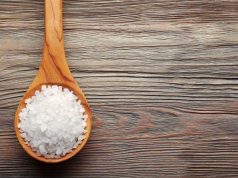Significant weight loss, improvement in pulse pressure, normalization of depressive symptoms observed with salt restriction
By Elana Gotkine HealthDay Reporter
WEDNESDAY, March 22, 2023 (HealthDay News) — For patients with primary aldosteronism, dietary salt restriction is associated with a reduction in blood pressure, according to a study published online March 22 in the Journal of Internal Medicine.
Holger Schneider, M.D., from Klinikum der Universität München in Germany, and colleagues examined the impact of a moderate dietary salt restriction in 41 patients with primary aldosteronism on a stable antihypertensive regimen, including mineralocorticoid receptor antagonist treatment. Participants followed a dietary salt restriction for 12 weeks, with structured nutritional training; a mobile health app was used for consolidation. Every four weeks, salt intake and adherence were monitored.
The researchers found that at the end of the study, dietary salt intake decreased significantly from 9.1 to 5.2 g/day. Significant improvements were seen in systolic (130 to 121 mm Hg) and diastolic (84 to 81 mm Hg) blood pressure, in parallel. There was also improvement observed in patients’ aptitude for estimating dietary salt content (underestimation decreased from 2.4 to 1.4 g/day). A significant weight loss of 1.4 kg, improvement in pulse pressure, and normalization of depressive symptoms were seen with salt restriction. Independent associations with blood pressure reduction were seen for salt restriction, cortisol after a dexamethasone suppression test, and dosage of renin-angiotensin-aldosterone-system blockers.
“Our findings will help to improve care for patients with primary aldosteronism and, likely, also for subgroups of patients with essential hypertension,” the authors write.
Copyright © 2023 HealthDay. All rights reserved.








